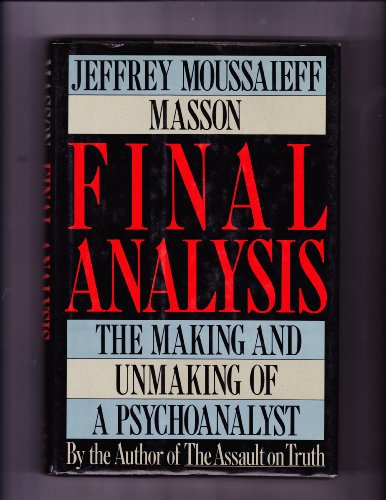Final Analysis : The Making and Unmaking of a Psychoanalyst
Masson, Jeffrey Moussaieff
From
Better World Books: West, Reno, NV, U.S.A.
Seller rating 5 out of 5 stars
![]()
AbeBooks Seller since March 14, 2016
About this Item
Description:
Former library book; may include library markings. Used book that is in clean, average condition without any missing pages. Seller Inventory # GRP61916187
Synopsis:
The former Projects Director of the Sigmund Freud Archives exposes psychoanalytic training as a bizarre, inequitable socialization process and reveals what the gurus of psychoanalysis are really like
Reviews:
In becoming a psychoanalyst, Masson, like Shakespeare's Malvoleo, mistook the trappings for the thing itself; that he never achieved the power he bestowed on such figures as Kurt Eissler and Anna Freud is his continuing complaint. He trained at the Toronto Psychoanalytic Institute and, even before graduating in 1978, insinuated himself into the international psychoanalytic community. As projects director of the Freud Archives in London, he hypothesized that Freud had deliberately suppressed his seduction theory. Masson ( Against Therapy ) faults his teachers for not hewing to the principle of full disclosure (failing to note that part of the psychoanalytic equation requires hiddenness) yet rails against their discussion of analysands. Best to read is his affectionate account of his tyrannous training analysis; worst, his fawning over analysts with clout. Masson left the "cult" of psychoanalysis without developing his own practice; the disappointment and blame that propel this volume suggest the rage of a child at a parent's fallibility. He makes no mention of his much publicized, unsuccessful libel suit against Janet Malcolm for her 1983 New Yorker profile.
Copyright 1990 Reed Business Information, Inc.
A former projects director of the Sigmund Freud Archives, Masson claims that he was fired for espousing and publicizing views concerning the sexual abuse of children that radically challenged psychoanalytic theories. Since then, he has been a thorn in the side of mental health professionals with his searing critiques of therapy. Here he abandons his formidable research skills for a personal glimpse into how, in his training and psychoanalytic career, he too became enmeshed in the mystique that psychoanalysis could cure unhappiness and that analysts were all wise and moral. Although Masson describes with great candor his wasted analysis, his rise in the elite inner circle, and his close ties with Kurt Eissler and Anna Freud, this is no autobiography but rather an attempt to knock psychoanalysis from its pedestal once and for all. Recommended.
- Janice Arenofsky, formerly with Arizona State Lib., Phoenix
Copyright 1990 Reed Business Information, Inc.
Bibliographic Details
Title: Final Analysis : The Making and Unmaking of ...
Publisher: Addison-Wesley Longman, Incorporated
Publication Date: 1990
Binding: Hardcover
Condition: Good
Edition: First Edition.
Top Search Results from the AbeBooks Marketplace
Final Analysis : The Making and Unmaking of a Psychoanalyst
Seller: Better World Books, Mishawaka, IN, U.S.A.
Condition: Good. First Edition. Used book that is in clean, average condition without any missing pages. Seller Inventory # 336966-6
Quantity: 1 available
Final Analysis: The Making and Unmaking of a Psychoanalyst
Seller: ShiroBooks, Eureka, CA, U.S.A.
Hardcover. Condition: Near Fine. Dust Jacket Condition: Near Fine. 1st Edition. 2nd Printing. BOLDLY SIGNED AND INSCRIBED by Author on title page. Book is straight, square, tightly and evenly bound (appearing never read) and clean of any PO markings and blemishes. Cover and Dust Jacket are clean, with sharp corners, mild shelving bumping to headband and tail, and clear, bright and distinct lettering (silver-stamped on Cover spine. Dust Jacket is intact (unclipped, still showing original USD $18.95 price) and has very mild shelving rubbing on the panels. (Please see Seller images). ISBN 020152368X. ShiroBooks, independent bookseller, prides itself in accurate descriptions, careful wrapping and safe shipping. Additional charge may apply IF SHIPPED OUTSIDE CONTINENTAL US; CONTACT SHIROBOOKS PRIOR TO ORDERING or for more information, details or photos. Signed by Author(s). Seller Inventory # 000779
Quantity: 1 available
Final Analysis: The Making and Unmaking of a Psychoanalyst
Seller: Between the Covers-Rare Books, Inc. ABAA, Gloucester City, NJ, U.S.A.
Hardcover. Condition: Near Fine. Dust Jacket Condition: Fine. First edition. Octavo. 212pp. Two-inch tear across topedge of front fly, spine slightly cocked, near fine in a fine dust jacket. Seller Inventory # 174317
Quantity: 1 available
Final Analysis: the Making and Unmaking of a Psychoanalyst
Seller: KULTURAs books, Los Angeles, CA, U.S.A.
Softcover. Condition: As New. Dust Jacket Condition: As New. First Edition; First Printing. Bound galleys (uncorrected page proofs) . Beige wrappers, As New. Book is firm in binding, unread. Press letter laid in. Free of any markings, not ex-library.; 8vo 8" - 9" tall; 212 pages. Seller Inventory # 2007
Quantity: 1 available

